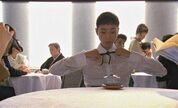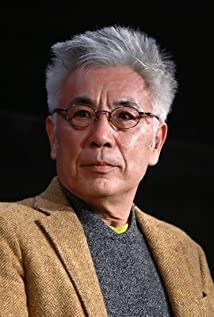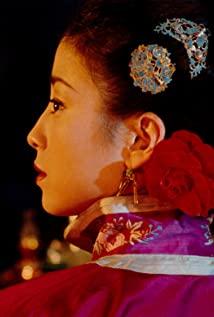Haruki Murakami won the "Group Portrait Newcomer Award" in 1979 with his debut work "Let's Hear the Wind Sing", and soon he was targeted by the film director. The following year, Kazuki Omori put this novel on the big screen, but unfortunately nothing happened. In 1982 and 1983, Naoto Yamakawa successively changed Murakami's short stories "Assault on the Bakery" and "Meet the 100% Girl" into short films of about 10 minutes, which did not make waves.
Looking at several films now, they are not just the early cases of Murakami's works. The experimental images contain interest beyond the frame of the text. When the filming is completed, there is no interest. It is probably due to the fact that it is always difficult for newcomers to be in their early years. . At that time, Murakami and the two directors who admired him were insignificant in their respective fields.
In 2010, French-Vietnamese director Chen Yingxiong, who won the Cannes Golden Camera Award and the Venice Golden Lion Award for "The Smell of Green Papaya" and "Tricycle Man", made "Norwegian Forest" into a movie. The film bears the personal brand of Chen Yingxiong's oriental poetry and was nominated for the 67th Venice Golden Lion Award. But in view of the fact that there are too many fans of the novel and it is difficult to adjust, Murakami fans do not buy it.
Compared with the above-mentioned films, Jun Ichii's 2004 film "Tony Takitani" (also translated as "Tony Takitani") adapted from Murakami's short story of the same name has been recognized by audiences at multiple levels.
The short story "Tony Waterfall" included in the anthology "The Ghosts of Lexington" is the only novel written by Murakami in 1990. The inspiration for writing came from his thrift store in Maui, Hawaii, when he bought a yellow T-shirt with the words "Tony Takitani" printed on the chest, and then began to imagine what kind of person "Tony Takitani" was.
Jumping from an old T-shirt into the literal world of Tony Waterfall, like the protagonists in most of Murakami's novels, can't escape the fate of loneliness. And what prompted him to form a loner character was his own name. Born shortly after World War II, he was Japanese through and through, but because of his name (and his roughly angular face and curly hair), he was often mocked as a boy of American-Japanese descent.
"As soon as the name is given, the other party shows an inexplicable or even disgusting look. Many people think that it is similar to a prank, and some people are even annoyed by it." Murakami's novel wrote.
However, compared with Murakami's previous works such as "Norwegian Wood", the loneliness depicted in this novel is no longer of a playful nature. As one of Murakami's transformational works, the loneliness in "Tony Waterfall Valley" is linked with war. It has nothing to do with the beauty and poetic melancholy that has been missed, cannot be grasped, and points to the real cruelty in life.
The movie "Tony Waterfall" restores the essence of Murakami's novels. Ichiichi's lens moves slowly from left to right from beginning to end, using the dark side of pillars and other objects or pure black to connect the scenes. Ryuichi Sakamoto's low and somber music runs through it, reflecting the lonely souls.
At the beginning of the film, Jun Ichi explained to the audience the autism of young Tony. On the streets at dusk, he focused on building exquisite ships, ignoring passers-by; in art class, he carefully sketched the veins of a leaf, which was inexplicably surprised by the teacher; on the way to school, he pedaled a bicycle and walked alone, "Student Cha Teenager" has nothing to do with him.
The times have given Tony the possibility of being alone with himself by relying on his eccentric talents. He painted by measuring the parts of precision instruments and became a sought-after illustrator, without having to have relationships with others beyond the scope of his work, just like his father Saburo Takitani, who only used jazz and trombone to connect himself to the outside world, not to the world An additional intersection occurs.
Both generations have not participated in the war directly, but the loneliness of the same strain was created by the war. During the war, the father had the experience of being isolated and helpless at the end of his life, and the name that left his son alone was given by the American military officer who was a "relict of the war".
Regarding the story of Saburo before and after the war, Murakami started with "Tony Water Valley's real name is called Tony Water Valley" and then diverged from the story. In the movie "Painting by the Gourd", as Tony's lonely background slowly disappeared, this sentence appeared in the form of a voice-over, bringing out the past of Saburo.
Saburo is a desperado in the tide of the times. Wrapped in historical changes, he took a trombone, fled from Japan to China, and returned to his homeland from Shanghai to save his life. irony. When he decided to take care of his heart, fate made fun of him again. Three days after his son was born, his wife passed away, and he restarted his game life.
The film integrates historical photos into images, showing Saburo's life without roots. The loneliness that he is accustomed to really devours his soul is that he is trapped in a Shanghai prison, thinking that there is not much time to come. For the state of mind of being trapped in prison, the film introduces the expression technique of stage play. In the third-person voice-over narration, the first-person "spiritual confession" is added to directly express the heart to the audience. And this approach is used throughout the film for every character who has a relationship with Tony.
Masaburo and Tony are not suitable fathers or sons for each other. The relationship between the two adheres to the principle of "meeting and chatting when something happens", they don't care much about each other's private life, and they don't think it is necessary to open their hearts to each other. Their specialty is the only carrier that can get along with loneliness and resist the disturbance of the outside world. They never thought that the carrier would also fail.
Although Tony didn't spend all day with women like Masaburo when he was young, he had no plans to get married. When he met a woman who "must get married" and waited for her answer, he experienced the horror of loneliness like never before. Tony experiences the ordeal in prison before Saburo's marriage.
Tony got his wish to "bring the beauty back", and took his wife to listen to the live performance of Saburo Sho. Because of the person next to him, he tasted a different taste than before. It is a pity that the good days are too short, and the wife repeats the fate of her mother.
If the loneliness that does not need a partner always has a fixed form, it is not bad. The scary thing is that it has been rewritten by warmth and discarded by warmth. The same applies to Tony's wife and the strange girl who was his assistant for a day.
Tony fell in love with his wife at first sight because she was well-dressed, but clothes were also her life. Buying a variety of beautiful clothes (presented in different shoes) is a "must have" way of self-identification for her. When buying more and more clothes, Tony had to convert a room at home into her personal dressing room. The two bought as many clothes as they could to start a conversation. The wife decided to stop, but died on the way to action. car accident.
Tony's wife in Murakami's pen has his own shadow. In the short article "About Shirts" published in "Sports Illustrated" in the early 1980s, Murakami once said: "I am not a person who pays special attention to dressing. I usually dress similarly, and my only preference is to buy shirts. Just look at the display. Shirts in the window of a menswear store calm down the mood before you know it."
With thoughts of his deceased wife, Tony hired a girl who matched his wife's age, height and body shape as an assistant at a high salary. He had no substantive work for her to share. He just hoped that she could wear his wife's clothes and help him slowly get used to the absence of his wife. fact. Because the girl chosen by the wife and Tony was played by Rie Miyazawa, the film deliberately emphasized that one of his selection criteria was the similarity in appearance between the two.
When a girl from ordinary background stepped into the "Princess's Room", she couldn't help crying, but it was just a sudden and dazzling variety of happiness, another form of impact on loneliness. However, her psychological satisfaction index was also out of her control. Tony's subsequent "sorry" cut off the possibility of her driving away loneliness.
Two years after his wife's death, Saburo also died of cancer. The room where his wife's clothes and shoes had been kept was emptied by Tony, briefly occupied by his father's legacy jazz records and trombone, but ultimately empty.
At the end of the film, Tony stays bored in an empty room, echoing his father's death in prison and the cry of a strange girl.
The room that was once filled with "sweet burdens" has become a prison that Tony cannot escape for the rest of his life.
View more about Tony Takitani reviews










